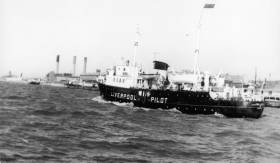Displaying items by tag: Irish Sea shipping
In Safe Hands: The Story of the Liverpool Pilots
#Exhibition - Dublin Port has strong historical trading links across the Irish Sea with the Port of Liverpool. The English north-west port is where an exhibiiton: In Safe Hands-The Story of the Liverpool Pilots is on display at the Merseyside Maritime Museum.
So set sail with the Liverpool Pilots on a journey from 1766, through the world wars and onto the thriving modern port of Liverpool. The exhibition (ending 4 June) tells the story of the heroic Liverpool Pilots and explores their vital role in navigating ships in and out of the Port of Liverpool.
Marking the 250th anniversary of the Liverpool Pilotage Service in 2016, In safe hands highlights dramatic examples where the Pilots’ judgement and bravery have saved lives and cargo from disaster. Liverpool waters are some of the toughest in the world to navigate. Ships entering Liverpool Bay and the River Mersey face serious hazards and rely on the skills and knowledge of pilots to ensure their safe passage.
The exhibition explores the development of the Pilotage service within the wider history of the Port of Liverpool, from the explosion of growth in the 18th and 19th centuries, decline in the mid to late 20th century, through to the thriving port of the 21st century.
Meet the Liverpool Pilots
Watch videos about:
The Three Cunard Queens' visit to Liverpool.
What makes a good pilot?
Life at sea on a pilot ship
Free events
The exhibition is accompanied by talks by award-winning guides on board former pilot station ship, Edmund Gardner. For more information click: In Safe Hands events.





























































